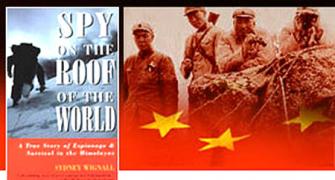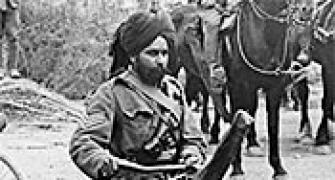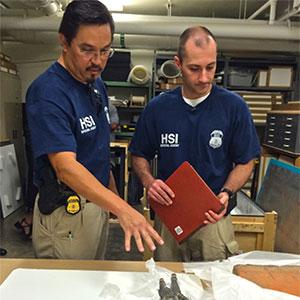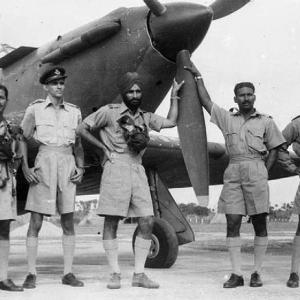John Lang represented Rani Laxmibai in her legal battle against the East India Company to stop the annexation of her kingdom of Jhansi.
Rediff.com's Archana Masih profiles the maverick Aussie who spent 22 years in India and became a friend in its dark days of bondage.
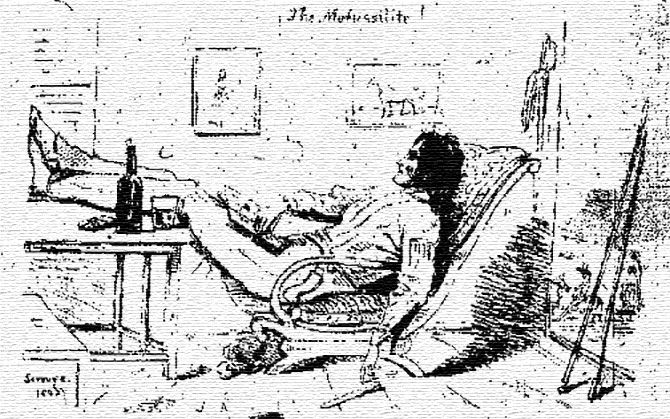
It was 1964; the writer Ruskin Bond had just moved to Mussoorie from Delhi when an Australian newspaper clipping arrived for him by post.
It was sent by a friend about a maverick Australian writer and barrister who had lived in India and died in Mussoorie.
Bond, with an abiding interest in old cemeteries, was piqued.
In the past, he had discovered many old graves and set about looking for the grave of John Lang who spent 22 years in India and died aged 48 in 1864.
No one in Australia or India seemed to have heard of him and Bond made several trips to find his grave.
"I couldn't find it because it had got covered over by grass," he says. "I finally did locate him with the help of the old burial registers and when I removed the moss, the lettering was there -- 'John Lang, Barrister at Law. Died Landour 1864.'
Bond did not know much about Lang then, barring little snatches of information that he was a journalist-writer, was in the cross hairs of the British for being anti-colonial and was a lawyer for Rani Laxmibai.
"Whenever I had a chance I tried to find out about him. Those days there was no Internet. I discovered his books were long out of print," says Mr Bond, who wrote an introduction when Rupa Publications reprinted Lang's book Wanderings in India recently.
On a trip to England, Lang had met Charles Dickens who was at the height of his success. Dickens invited him to write about his experiences in India for his magazine Household Words and Lang became a regular contributor.
The stories of his encounters with big and small rajas, accounts of his travels in escorted palanquins with a posse of horsemen, of reviving an English soldier dying of cholera with a whiskey concoction and his meeting with Rani Laxmibai provide interesting vignettes of life during the Raj
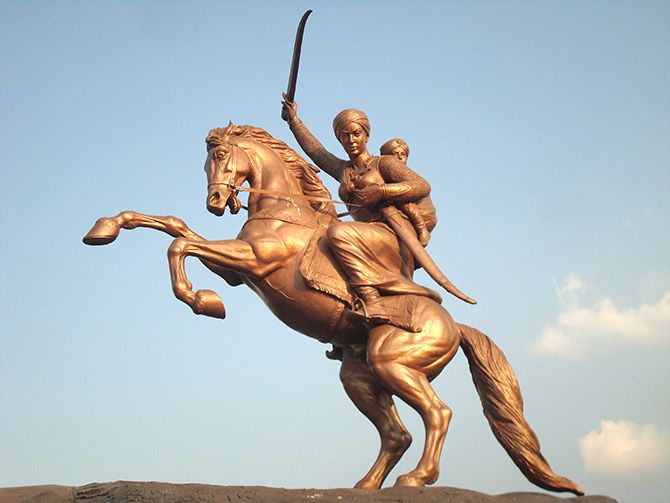
In India, John Lang only evokes interest because he was a lawyer for Rani Laxmibai of Jhansi, says Amit Ranjan, who is ready with a book on John Lang after ten years of research.
The Maratha queen had summoned Lang to petition the East India Company against the annexation of Jhansi after hearing that Lang had won a case for an Indian merchant against the Company.
The Company had to repay the trader almost 50 lakh they owed for the provisions supplied to the army. Lang may have won the case, but the British subsequently jailed him for libel.
"He was a curious character. A negotiator of this sub culture," says Amit Ranjan, an assistant professor of literature at Zakir Hussain College in New Delhi and recipient of the Fulbright Scholarship 2015-2016.
"He fought cases only for the Indians against the British. As a journalist he wrote against the British. He also published military gossip in his newspaper."
Lang is perhaps the only writer to provide a first hand account of Rani Laxmibai's personality -- of the conversation she had with him and what her palace looked like.
According to his description, Laxmibai was about 27 when he was granted an audience with her. She had sent a rare white elephant with a silver houdah to bring him to the palace from the encampment ground.
Ministers on Arab horses flanked him and soldiers stood by the wayside as he made his way, Lang wrote in his account in Wanderings in India (Rupa Publications).
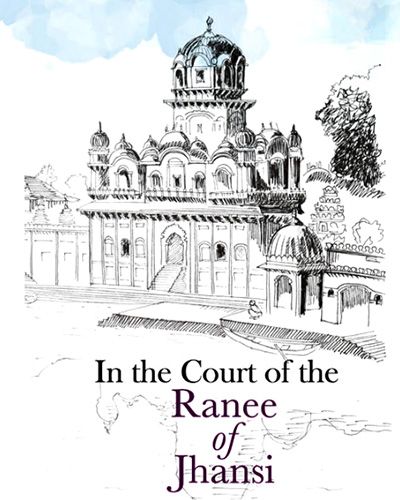
Though she spoke from behind a purdah, Lang wrote that he got a glimpse of her when the purdah was drawn briefly by her adopted son.
She wore no ornaments except a pair of earrings, wore a white muslin sari and her expression was very intelligent.
When he couselled her that she should petition the throne rather than the governor general and take the pension that the Company offered her, Lang further wrote that the Rani energetically exclaimed: 'Mai Jhansi nahi doongi! (I will not give away Jhansi!).'
The petition against the seizure of the Rani's kingdom was dismissed by the British court within a week, and Ranjan feels hiring Lang as counsel was a mistake on her part because the government was determined to humiliate him if they encountered him a second time.
"It was a little episode in his life, but, of course, that becomes the hash tag these days. It was one of the minor things in his life, but he boasted about it in hindsight knowing the importance of Rani of Jhansi. He also emulates the character in one of his novels," Ranjan says in a telephone conversation after returning from the University of Florida as a Fulbright Scholar.
"In his newspaper writings Lang seemed very aware of Indian political history and knew the scene of the Upper Provinces very well. His novels had characters displaying resistance against the British. He wanted to be as popular as Dickens," adds Ranjan, who traced Lang's descendants in Australia while researching his book.
Lang learnt Hindustani and apart from being a successful lawyer also edited a newspaper The Mofussilite which was largely anti-establishment.
He spent most of his years in Meerut and Mussoorie and has written accounts of his meetings with Nana Sahib, Tantiya Tope and the noblity of Awadh.
He had arrived in India with his first wife Lucy who divorced him and returned to England. Later, Lang remarried an Anglo Indian girl and had a son, but one doesn't know what happened to them, says Ranjan.
Acknowledging Lang's remarkable association with India, Prime Minister Narendra Modi presented then Australian prime minister Tony Abbott, a collage containing photographs of John Lang's 1854 letter to the governor general on Rani Laxmibai's behalf when he visited Australia in 2014.
The collection of four pictures included Lang's marriage certificate of 1861 from the records of Christ Church in Mussoorie, a plaque dedicated to him in the same church and a photograph of his grave.
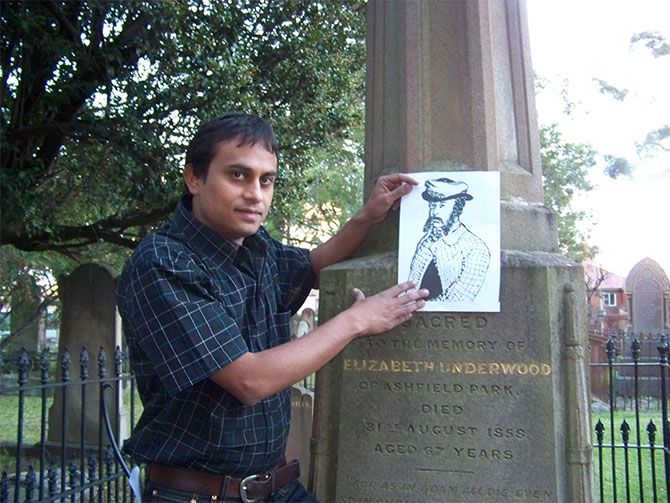
"What is lacking between India and Australia is a historical sense. With Britain we have a long historical association. With Egypt we have a very long history of trade. With China-Japan a long history of Buddhism -- what is lacking with Australia is a sense of history," says Ranjan.
"We equate cricket with Australia, but Lang's history pushes it back by a good 50 years. In a very strict sense, he barely had anything to do with Australia because he never returned to Sydney after he left at 26. But it has significance as a historical narrative," he adds.
There was some initial euphoria after Modi's gesture, feels Ranjan, but Lang continues to be obscure and forgotten.
"He is a very interesting character and represents an alternate view of history," says Ranjan. "We know historians both British and Indian come with a lot of baggage, he is someone in between -- an interloper, who is anecdotal with a different kind of view."
"I see in John Lang a fun character," says Ranjan. "I am wary of calling him an Indian hero because when a historical figure becomes super-heroic he starts obliterating its historical importance and the complexities of the character."
Lang spent his last year in the Himalaya Club in Mussoorie which still exists -- and rests unknown in the hill town's cemetery.

